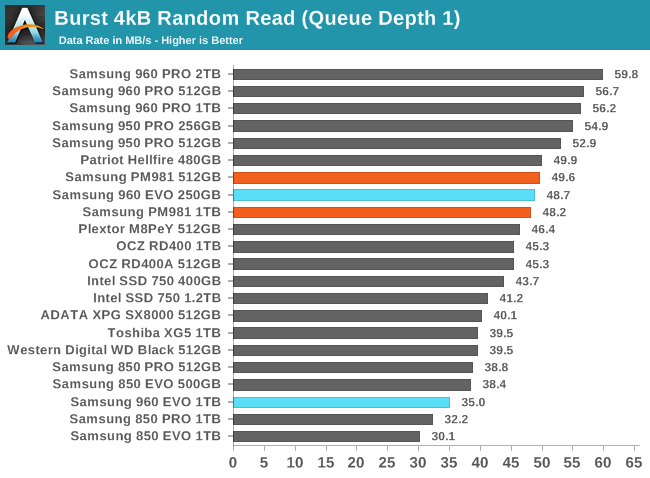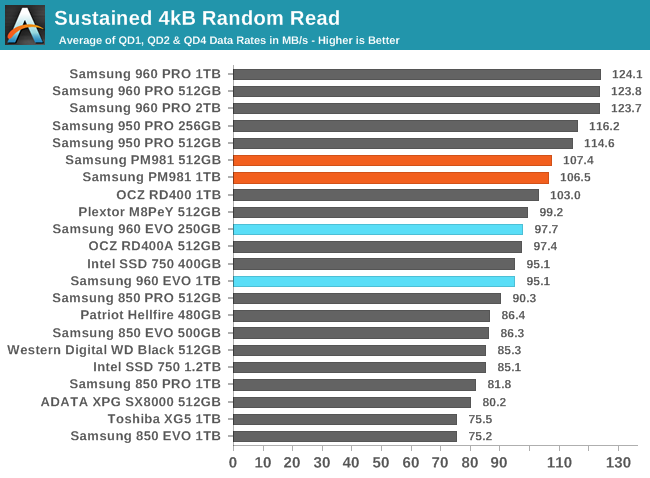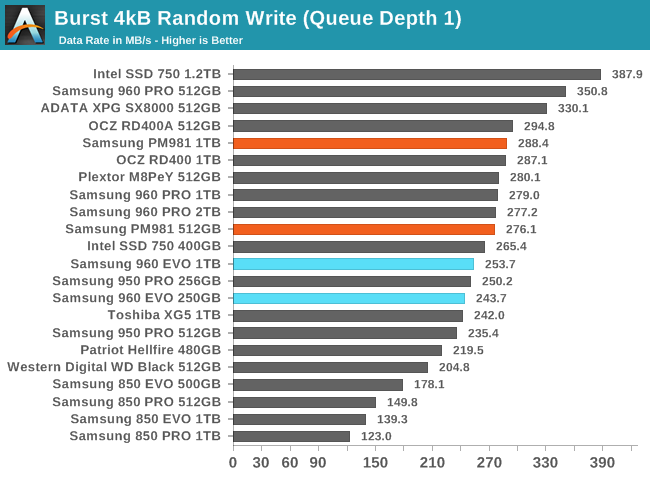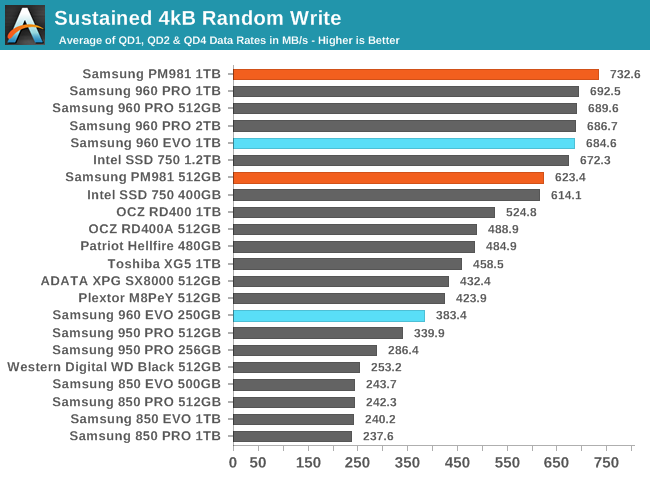The Samsung PM981 SSD Review (512GB, 1TB): Next Generation Controller And 3D NAND
by Billy Tallis on November 30, 2017 9:02 AM ESTRandom Read Performance
Our first test of random read performance uses very short bursts of operations issued one at a time with no queuing. The drives are given enough idle time between bursts to yield an overall duty cycle of 20%, so thermal throttling is impossible. Each burst consists of a total of 32MB of 4kB random reads, from a 16GB span of the disk. The total data read is 1GB.

The burst random read performance of the Samsung PM981 is great by the standards of TLC SSDs, but is surpassed by several MLC-based drives, including the Phison E7-based Patriot Hellfire with planar MLC NAND.
Our sustained random read performance is similar to the random read test from our 2015 test suite: queue depths from 1 to 32 are tested, and the average performance and power efficiency across QD1, QD2 and QD4 are reported as the primary scores. Each queue depth is tested for one minute or 32GB of data transferred, whichever is shorter. After each queue depth is tested, the drive is given up to one minute to cool off so that the higher queue depths are unlikely to be affected by accumulated heat build-up. The individual read operations are again 4kB, and cover a 64GB span of the drive.

On the longer random read test that includes some higher queue depths, the PM981 comes a bit closer to the standard set by Samsung's MLC drives, and it outperforms all the non-Samsung drives.
 |
|||||||||
Both capacities of the PM981 show performance scaling with queue depth in the typical manner for a high-performance drive, though the 512GB model has passed an inflection point by QD32 and is approaching saturation.
Random Write Performance
Our test of random write burst performance is structured similarly to the random read burst test, but each burst is only 4MB and the total test length is 128MB. The 4kB random write operations are distributed over a 16GB span of the drive, and the operations are issued one at a time with no queuing.

There are a few MLC-based SSDs that offer substantially higher burst random write performance than the Samsung PM981, but it is on par with most high-end drives including the Samsung 960 PRO.
As with the sustained random read test, our sustained 4kB random write test runs for up to one minute or 32GB per queue depth, covering a 64GB span of the drive and giving the drive up to 1 minute of idle time between queue depths to allow for write caches to be flushed and for the drive to cool down.

On the longer random write test, the 1TB PM981 stands out with clearly higher performance than the Samsung 960 series could manage. The 512GB PM981 is slower but still definitely performing like a high-end drive.
 |
|||||||||
The random write performance of the 1TB PM981 scales very well with increasing queue depth. As compared to the Samsung 960 series, it also reaches its plateau around QD8, but is providing much higher throughput by that point. The 512GB model runs out of SLC cache during portions of this test so its performance is much lower and less steady.










53 Comments
View All Comments
tsk2k - Thursday, November 30, 2017 - link
It's all about that 3D-Xpoint nowadays.rsandru - Thursday, November 30, 2017 - link
Speaking of which, can we have the Optane 900p data points back in?boeush - Thursday, November 30, 2017 - link
Hmm, yeah - all about 1 TB 3D XPoint - how much would that cost, again, and what's the retail availability of the M2 form-factor?ddriver - Thursday, November 30, 2017 - link
Unfortunate after so many years of complete domination samsung is not even trying anymore. It will be TLC all over in order to squeeze out every cent worth of profit from that advantage.Spunjji - Thursday, November 30, 2017 - link
"...the PM981 has caught up to or surpassed the MLC-based 96x drives on many tests, setting new records not just for TLC-based drives but for client SSDs as a whole."Right; they're clearly not trying at all. :|
mapesdhs - Thursday, November 30, 2017 - link
"...in order to squeeze out every cent worth of profit from that advantage."That's called business. If rivals don't like it, they should make something better and bring it to market. I might not like how Samsung has managed its pricing, etc., but if I were them, then based on fiduciary duty to shareholders I would do exactly the same thing.
ddriver - Thursday, November 30, 2017 - link
They are not, but it requires north of a simpleton's way of looking at it to see it. Because they could have kept MLC and offered a significant boost in performance thought the entire drive.And the claim that using TLC it catches up on MLC drives is just nonsense. There is no engineering miracle here. There is simple caching at play, the drive doesn't touch TLC for the duration of AT's flimsy test suite. Once the drive runs out of cache performance quickly gets abysmal - about 750 mb/s once it gets to the point of using TLC directly. Not to mention the reduced endurance.
Granted most casual consumers won't be doing anything as data intensive, but many prosumers will, which means that current consumer grade drives are no longer adequate for prosumer applications, which wasn't the case with the previous generation, indicating that samsung is indeed taking a step back.
And things are not looking too well in the more affordable enterprise range neither, its lousy with TLC as well. Meaning that samsungs devolution now forces prosumers to shop for the much more expensive high-end enterprise storage solutions.
I don't mind TLC. What I mind is depriving the market of MLC. I didn't mind paying the MLC premium for the 960 PRO over the EVO. It was a good deal. I mind that they are taking that deal away from the market. And if you had 2 properly working brain cells you'd mind that too.
MFinn3333 - Thursday, November 30, 2017 - link
"There is simple caching at play, the drive doesn't touch TLC for the duration of AT's flimsy test suite."What? Here is the destroyer benchmark's description...
Total GB Read: 1583.02 GB
Total GB Written: 875.62 GB
Total IO Operations: 49.8 million
Queue depth is 50% 1 depth.
What is your definition of flimsy?
mkaibear - Friday, December 1, 2017 - link
This is deedee, his definition of "flimsy" is "if there is any possible way in which I can be right, then I meant that".ddrіver - Thursday, November 30, 2017 - link
Exactly. The products are better because time passes on and technology advances, not because they are actually struggling to make them better. Profit is their number one concern performance just happens to increase from time to time...